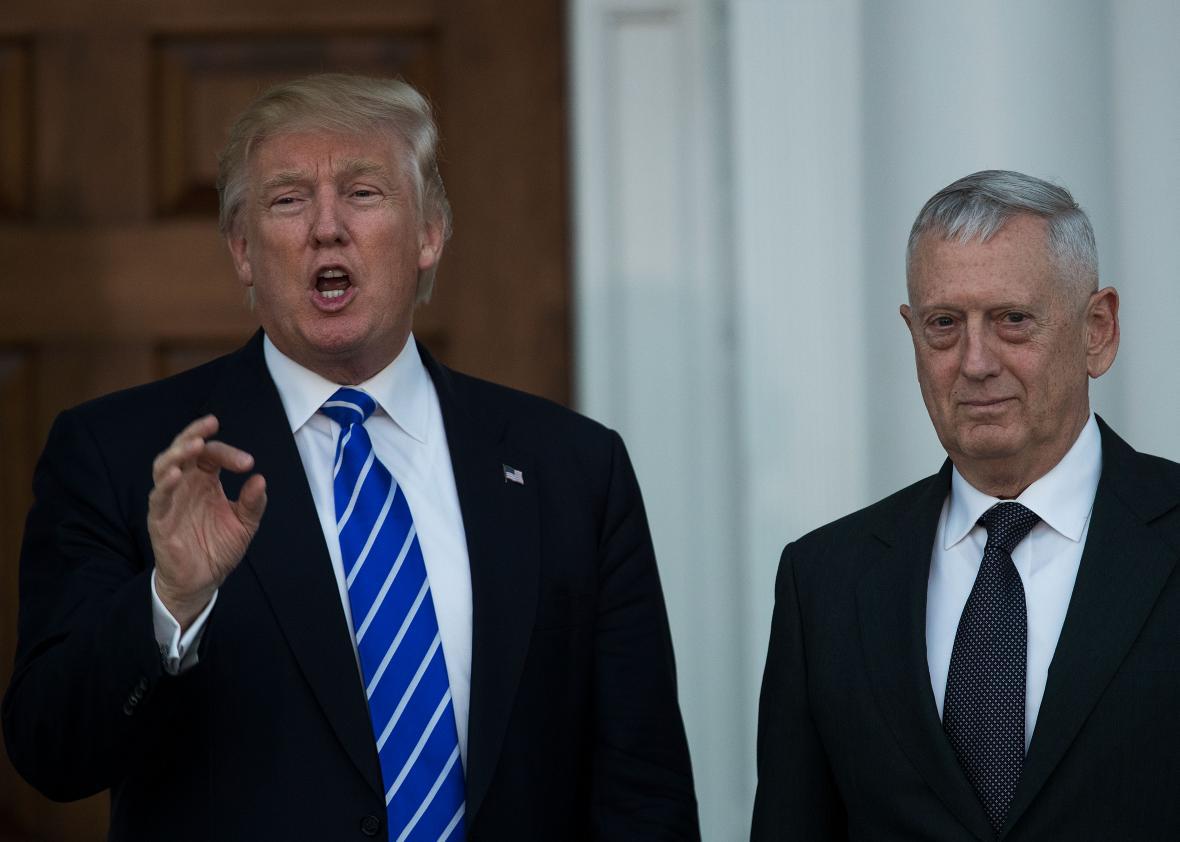Much of the coverage of Donald Trump’s wide-ranging interview with the New York Times on Tuesday has suggested that the president-elect is backing away from some of his more controversial campaign pledges, including his support for the use of waterboarding and “a hell of a lot worse than waterboarding” against terrorism suspects. Remember, Trump unambiguously said during the campaign: “Don’t tell me it doesn’t work—torture works.” In the interview, Trump seemed impressed by the anti-torture stance of retired Marine Gen. James Mattis, a candidate for secretary of defense:
General Mattis is a strong, highly dignified man. I met with him at length and I asked him that question. I said, what do you think of waterboarding? He said — I was surprised — he said, “I’ve never found it to be useful.” He said, “I’ve always found, give me a pack of cigarettes and a couple of beers and I do better with that than I do with torture.” And I was very impressed by that answer. I was surprised, because he’s known as being like the toughest guy. And when he said that, I’m not saying it changed my mind. Look, we have people that are chopping off heads and drowning people in steel cages and we’re not allowed to waterboard. But I’ll tell you what, I was impressed by that answer. It certainly does not — it’s not going to make the kind of a difference that maybe a lot of people think. If it’s so important to the American people, I would go for it. I would be guided by that. But General Mattis found it to be very less important, much less important than I thought he would say. I thought he would say — you know he’s known as Mad Dog Mattis, right? Mad Dog for a reason. I thought he’d say “It’s phenomenal, don’t lose it.” He actually said, “No, give me some cigarettes and some drinks, and we’ll do better.”
It’s tempting to be encouraged by the answer, which suggests that Trump can be reasoned with, or at least that he can be talked down from some of his worst impulses as long as the messenger is a guy who’s killed a lot of people, is nicknamed “Mad Dog,” and comes equipped with some snappy one-liners.
But the answer is disturbing for a number of reasons. For one, the fact that Trump was “surprised” that a tough ex-marine like Mattis would oppose torture, a pretty common opinion among current and retired military commanders, suggests that he’s shockingly uninformed about this topic. What exactly was he basing his previous confident assertion that “torture works” on?
He’s also still making the argument, as he did during the campaign, that it’s unfair the U.S. can’t waterboard when its enemies are “chopping off heads and drowning people in steel cages,” suggesting that the type of tactics America uses should be determined by the brutality of its adversaries rather than by any legal or moral standards. (One topic that didn’t come up in the Times interview: whether Trump still feels that the killing of terrorists’ families is justified.)
Trump also suggests even if Mattis is right that torture isn’t effective, “if it’s so important to the American people, I would go for it,” which suggests that in Trump’s mind, public opinion supersedes military efficacy, domestic law, and the constitution and is basically an endorsement of public policy via American Idol-style vote. Is Trump even aware that U.S. law prohibits waterboarding? He seems to believe it’s solely his call to make.
It’s an attitude that’s disturbing on far more issues than just this one.
